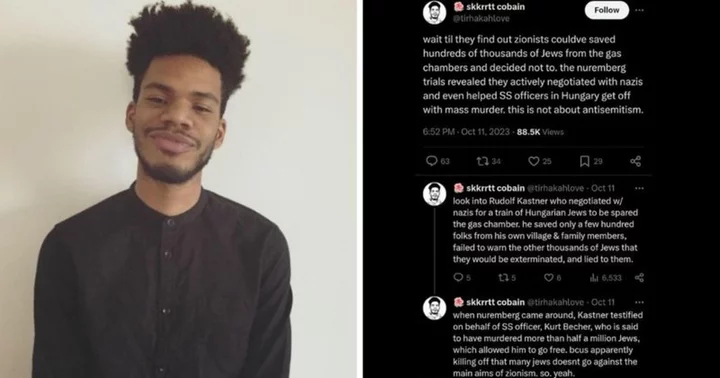NEW YORK CITY: A New York Magazine journalist has ignited a firestorm of controversy with his recent inflammatory remarks.
Tirhakah Love, a senior writer at NY Mag and the author of the Dinner Party newsletter posted a series of tweets on October 11, 2023, that have been widely condemned.
Tirhakah Love's antisemitic posts spark outrage on Twitter
While the posts initially went unnoticed, they later caught the attention of the online community, prompting Love to make his Twitter account private.
In one of his shocking tweets, Love claimed, "Wait til they find out zionists could've saved hundreds of thousands of Jews from the gas chambers and decided not to."
He went on to make a troubling assertion and said, "The Nuremberg trials revealed they actively negotiated with Nazis and even helped SS officers in Hungary get off with mass murder. This is not about antisemitism."
Notably, Love had previously faced backlash for controversial statements. In the past, he expressed joy at the death of Queen Elizabeth II, which drew criticism from various quarters, according to the Daily Mail.
Prominent figures and critics weigh in on Tirhakah Love's comments
Yascha Mounk, a German-American political scientist and writer for The Atlantic, swiftly denounced Love's tweets. He compared Love's remarks to a controversial letter authored by Harvard students, which held Israel solely responsible for the violence.
Mounk remarked, "Writer for Vox and New York Magazine: Hold my beer. Hm. How can I beat the depravity of that. OK, I got it: 'Zionists' are responsible for the Holocaust."
The letter from Harvard students and its consequences were coincidentally covered in a New York magazine article just days before the backlash against Love.
Mounk also expressed his view on cancel culture and said, "I don't want journalists fired over a single tweet, no matter how stupid and vile. But one of the things that makes cancel culture so corrosive is that it turns everything into a zero-sum conflict—and reveals very clearly who counts and who doesn't."
He further raised questions about whether a writer making similar controversial claims about other groups would face the same consequences, highlighting the issue of perceived privilege and discrimination.
It's worth noting that Mounk himself has a personal connection to the Holocaust as several of his mother's family members were killed during the dark period in history.
Love's inflammatory comments didn't go unanswered. Eric Seufert, an author and quantitative marketer, responded and said, "What you've written here is patently false, and the conclusions you draw from your own ahistorical interpretation of the facts are utterly deranged and reprehensible."
Love's assertions were widely criticized for their historical inaccuracies and inflammatory nature.
Ami Dar, the founder of Idealist.org, a job posting board for nonprofits and volunteer work, also took issue with Love's comments.
He cautioned Love and said, "You need to be careful. I am serious. Antisemitism is a virus that eats your brain. You may be too far gone, but seek help before it's too late."
Dar, who was born in Jerusalem, urged Love to reconsider the impact of his statements.
Tirhakah Love's history of controversial statements
This controversy is not Love's first encounter with public outrage. In a previous edition of his Dinner Party newsletter, he faced criticism for his comments on the death of Queen Elizabeth II, where he referred to her as a "colonizer" and expressed a lack of mourning for her passing.
The Dinner Party newsletter, launched in April 2022, aims to capture and comment on the most tumultuous and contentious moments in entertainment, politics, and corporate affairs. Before his current role, Love worked as an entertainment reporter at The Daily Beast for four months.
In his professional profile, Love describes himself as "skilled in Culture Criticism, Essay Writing, Reporting, Public Speaking, and Leadership."
The recent controversy surrounding Love's tweets has raised questions about the boundaries of free speech, the responsibility of public figures, and the impact of inflammatory comments in the digital age. It remains to be seen how Love and the publications he writes for will address this situation.









